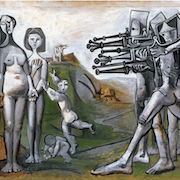|
Note to mods: You know who I am. I'm a libertarian who is staring his own thread, which is acceptable according to the rules, I assume? There are two reasons I want to start a specific thread rather than retread over the "other" libertarian thread and just post comments there. In the first place, I want this discussion to be more narrow in scope. And I want to say something at the beginning that everyone will have a chance to read. On Caros's thread, he specifically poisoned the well from the very beginning by writing an OP describing libertarianism and its adherents in an unflattering and, from my perspective, misleading way. By the time I first posted on that thread, there had already been something like two hundred pages of people making GBS threads on libertarianism before I had a chance to defend it. And since the thread was almost entirely directed at me in particular (it would not exist without my having posted here in the past), you can understand how I'd like to have a bit more discretion about the framing of the debate when I am outnumbered 30 to 1. If there is any problem with me posting my own topic, I will cease and you can remove it. But if I don't break any clearly stated rules, I hope you would welcome a libertarian voice here in the service of a full discussion rather than a self serving bias-reinforcing circle jerk, something that is far too common. I have no doubt that whatever confines I initially set out to limit the scope of discussion, it will soon expand out on dozens of directions covering every element of libertarianism. But I'd like to describe libertarianism a bit differently from how you may have heard it described in the past. The central theme of this OP is property, what is it, what constitutes legitimate property rights and what is the origin and function of private property rights? The real distinction between libertarians and nearly everyone else is not their opposition to the State since there are anarcho-communists and anarcho-syndicalists who also oppose the existence of States. It is not even our belief in the non-aggression principle. Rather, as you probably guessed, it is our understanding of private property that sets us apart. After all, how can you know what constitutes an act of aggression if you can't clearly articulate between what is mine versus what is yours? It is often stated by misinformed left-Progressives that libertarians or other free market advocates have a fetish for private property rights; that we elevate property as a right above human rights, that our insistence on private ownership creates conflict between those who have more and those who have less and encourages human greed and alienation between different groups of people. As to the first claim, this one is always amusing because it is so crystal clear to a libertarian that there is no meaningful distinction between property rights and human rights. But much more important is the fact that we recognize that a correct understanding of private property is essential to a flourishing, healthy society and that human progress is inexorably linked with a legal recognition of private property claims. The reader should be disabused of the notion that libertarians have some obsession with private property or criticize public, or society-"owned" property based on any shallow ideological grounds. The reason we oppose socialism is that its core tenets are in conflict with observable reality. Were reality to be different than it is, libertarians would gladly abandon the concept of private property (outside of our physical bodies) as meaningless and of no use. For example, suppose we lived in a mythical "Garden of Eden", a paradise where everything that people desire was available in super-abundance. Everyone could satisfy all their needs an desires and no-ones use of any resource would in any way hinder anyone else's ability to use that resource. In such a theoretical world, property would cease to have any meaning in external objects outside of our physical bodies. Our bodies would remain scarce, and so we'd still need to have a property right in those (i.e. no assault, murder, rape). The reason property rights are so incredibly essential is that we live in a world of scarcity. In such a world, the desires, wants and needs of humans will always exceed the available goods needed to fulfill all our desires simultaneously. Therefore situations inevitably arise where two or more people want to use the same scarce resource to achieve two completely incompatible desired ends. This inevitable human conflict that arises from the reality of scarcity necessitated the acceptance of norms, or rules for determining who had the right to exclusive control over what scarce resource. Without this developing and widespread recognition by early human civilizations of basic private property rights, the emergence of modern industrial society, of production, commerce, agriculture and all the trappings of civilization would never have been possible. Humans would have remained perpetually in conflict, as primitive hunter gatherers living at a subsistence level. This should not be controversial. If we can agree on the vital necessity of the recognition of private property rights for human evolution and survival, then what rules ought to be in place for the attainment of legitimate property that should be legally enforced? The libertarian answer is that the first user to appropriate a resource out of its naturally environment and transform and improve it for the furtherance of his well-being has the best claim to ownership of that scarce resource. This, as you already know, has been referred to as the homestead principle. And it predated John Locke as a recognized norm in primitive civilizations millennia before he coined the phrase for the modern science of economics to make sense of an existed social phenomena. Had any other principle of property ownership and use-rights been adopted, the human race would have died off. This is not hyperbole. Let's suppose not the first user of something has the right to exclusive control of a scarce resource, but rather that the fifth user was the one who had that right. How could we eat? If I'm the first person to claim ownership of a coconut tree, or a water spring, but I don't have any property right in that thing, then I wouldn't be able to justly use that scarce resource. I'd starve and die of thirst. We'd all have to wait around for the fifth user of everything. Naturally, humans desired above all else to survive and improve their condition. And it makes intuitive and logical sense to most people to give the earlier user precedence over a later user. Once this recognition of property rights was recognized, not perfectly but to a large enough extent, great strides in living standards were made immediately available to the human race. Suddenly a division of labor was possible, free exchange was made possible and barter soon led to the development of the first currency. People could save in excess of their immediate consumption needs because they knew that they had the legally recognized and enforceable right to their property. Conflict was reduced and peaceful cooperation was encouraged. Given the reality of scarcity, what humans need more than anything else are social rules and a legal system that facilitates ever greater material production such that people can attain more and more of their needs and desires. What we are essentially doing is moving towards less and less scarcity through greater and greater productive capacity in modern economies. This, of course, should be considered a great thing for human welfare all around. Left-progressives frequently speak about the plight of the poor and the continuing social problems that exist throughout much of the world. However, the engine that drives the greatest and most robust increase in society-wide wealth for everyone is one in which property is private and the division of labor, capital accumulation, investment and a free price system are permitted to function unhampered. I've asked for a better and more coherent method by which property should be acquired other than original appropriation and I have not heard an answer. I'm going to throw in a curve-ball here and talk about another so-called "property" right that isn't actually property at all. That is what is called Intellectual Property. Libertarians oppose the existence of so-called "intellectual property" at all. But why would that be? The reason is that property is only a coherent and useful concept when it applies to things that are scarce. Copying a movie cannot be theft if you owned the original that you made a copy from. No one else was deprived of any physical possession whatsoever. Since copying can be done, theoretically infinitely, without depriving anyone of their copy, there is no scarcity and no theft. Patents on inventions present a similar case. Ideas are not scarce. If you freely share an idea and someone emulates or improves upon that idea, society is all the better off. Society has been made incalculably poorer and many corporations unjustly wealthier than they ought to be because of this grotesque State-monopoly privilege known as intellectual "property". Therefore things that are not scarce can indeed be held in the "commons", and in fact society is much better when we have socialism for ideas and computer data for example. Left-progressives frequently rail about the need for a legally mandated "right" to a service like healthcare forgetting or never understanding in the first place how the services needed to supply the growing human need are most efficiently produced and allocated. You might have an abstract "right" to a heart surgery, but if the sort of economic system and the State regulations and mandates heaped upon it don't produce enough hospitals, doctors and medical equipment, you won't get the care you need despite what politicians might claim. If you're concern is largely for the material well-being of society's most vulnerable, surely you'd want the economy to be as physically productive as possible? The problem facing the poor is not that they make $8.50 and not $15 an hour. The problem is that they don't have enough basic "stuff" to give them a reasonable standard of living. And why don't they? They economy is not physically productive enough to provide them with needed and desired goods or there are artificial impediments to employment and/or entrepreneurship that constrains their available options. A problem with "democracy" and all forms of collective ownership either of the factory or of public spaces is that use for such resources is heavily constrained by the need for consensus to act. If all workers owned factories together, endless meetings and deliberations would be required to make any decisions about the use of capital and production. Furthermore, conflict is enhanced rather than reduced. Who would REALLY have the final say on the use of collectively owned property? Well, no one does. All this wasted energy determining the best use of scarce resources leads to a tortoises pace to decisions that otherwise would be made by individual owners of these resources rather rapidly. This leads to paralysis and loss of productive capacity. If everyone can determine the use of property they own and put it to productive use immediately or trade it to another in an exchange immediately, the economy is made wealthier and decisions are made quickly by individuals who bear the personal responsibility for risking their capital and ONLY their capital in the effort. I've spoken about the Tragedy of the Commons in the past, but that is one more effect of property not being privately owned. When no one has a financial incentive to maintain the capital value of a piece of property, everyone has an incentive to overuse that property, even towards ecological destruction. This was the story of the American Buffalo which was hunted to the brink of extinction when it was a part of the "commons" yet made a major comeback once private entrepreneurs homesteaded the animals and judiciously decided which to kill for meat and which to breed to replenish the livestock for future generations and future profit opportunities. If we lived in an alternate universe without scarcity, then collective ownership of everything would make sense. No libertarian would dogmatically demand we maintain the concept of private property and homesteading with legal arbitration services if all goods existed in superabundance. If scarcity ceased being a limiting factor, then property would similarly cease being an important concept. There is a reason we don't parcel out oxygen rights for the air we breath. Oxygen is not scarce in any practical sense as it applies to human needs. Every human can breath as much as they want without limiting the ability of anyone else to breath as much as they want. As society becomes wealthier and more physically productive, people are more able to engage in charity and goods naturally become more "common" and shared freely. Scarcity and private property rights become much more important as concepts that closer people are to a subsistence level of existence. A person starving in Africa really loving needs you to recognize his property right in a loaf of bread he acquired and don't even think of asking him to share. But more prosperous societies have the luxury of freely sharing goods that are produced in such abundance that we feel less urgency about attaining what we need to live at a decent standard of living. I'd like you to explain to me the problem with the libertarian understanding of private property. And how, in a world of scarcity, that socialism is a feasible or coherent system? How could the human race have survived without the first-user principle of property acquisition being at least tacitly acknowledged? Left-Progressives always tout the "successes" of social democracies like Sweden or the social welfare State in the United States, but they always (as Scott Horton likes to say) "truncate and antecedents". You know what the best way to attain a small fortune? Start with a large fortune and squander some of your wealth. In example after example, left-progressives tout the relative wealth of modern-day Sweden or post FDR United States forgetting or never understanding that these countries that remain reasonably wealthy and can bear the burden of the socialistic demands on the economy have all, without any notable exceptions, had a lengthy history of laissez-faire free market fueled growth for decades and decades before their governments made a left turn and decided to implement a welfare State. This is absolutely true of the United States from the Industrial Revolution until the Progressive Era of the early to mid 20th century and it is also true of Sweden which had an incredibly laissez-faire free market economy during much of the same period of time and, even after their nominal shift leftward during the mid-20th century, the bulk of the socialist program so loved by leftist commentators is barely forty years old. Getting your cause and effect reasoning straight would do wonders to improve your understanding of these historical events. I'll leave it here for now. I want to try, at least initially, to limit the discussion to property rights as understood by libertarians, and their need under conditions of scarcity. I'd like to hear competing theories of initial property acquisition that make more sense that the first-user principle if you reject that theory. jrodefeld fucked around with this message at 06:54 on Oct 12, 2015 |
|
|
|

|
| # ? Apr 19, 2024 03:58 |
|
In the list of things that are important in the world, "competing theories of initial property acquisition that make more sense that [sic] the first-user principle" falls way, way, way below things like keeping people alive, healthy, well fed, and cared for. I'd say making sure everyone in their community has a decent pair of shoes is at least twelve spots higher on the list of problems people should address than anything involving the phrase "the first-user principle." So property rights are important enough I guess, but those other things come first. p.s. also your writing is very bad, and tedious, and unclear. Take time to remove stilted phrases like "The reader should be disabused of the notion that," because they make you sound like you're aping a nineteenth century blowhard. Sharkie fucked around with this message at 10:42 on Oct 9, 2015 |
|
|
|
Tell me about GMOs and scientific advances in terms of scarcity.
|
|
|
|
jrodefeld posted:
Even Marx said societies had to go through capitalism to then get to socialism, so I don't see the problem there. Sharkie posted:In the list of things that are important in the world, "competing theories of initial property acquisition that make more sense that [sic] the first-user principle" falls way, way, way below things like keeping people alive, healthy, well fed, and cared for. I'd say making sure everyone in their community has a decent pair of shoes is at least twelve spots higher on the list of problems people should address than anything involving the phrase "the first-user principle." Fados fucked around with this message at 11:50 on Oct 9, 2015 |
|
|
|
jrodefeld posted:By the time I first posted on that thread, there had already been something like two hundred pages of people making GBS threads on libertarianism before I had a chance to defend it. And since the thread was almost entirely directed at me in particular (it would not exist without my having posted here in the past), you can understand how I'd like to have a bit more discretion about the framing of the debate when I am outnumbered 30 to 1. Surely the market should be free to decide which ideologies get shat on?
|
|
|
|
Wait, is the main goal of Libertarianism to go back to hunter-gatherer society? I think it is based on this post OP.
|
|
|
|
Fados posted:...but if this is the premisse for libertarianism I guess it's the theory that describes a war ravaged, post apocalyptic world. Well it seems I just found my new favourite way to sum up libertarianism.
|
|
|
|
I really don't like how you strawman "Left-Progressives" at the end there.
|
|
|
|
Only after the bombs fall can humanity save itself and become the libertarian utopia Jrod envisions. Which is to say, a hellish wasteland of oppression and civil war. The Real Foogla posted:I really don't like how you strawman "Left-Progressives" at the end there. Let's be honest, Jrod and Libertarians in general are pseudo-closet Conservatives and Authoritarians. They pretend to have humanities best interest at heart while secretly wanting to amass massive wealth and kick the poor. Sharkie posted:p.s. also your writing is very bad, and tedious, and unclear. Take time to remove stilted phrases like "The reader should be disabused of the notion that," because they make you sound like you're aping a nineteenth century blowhard. Pseudointellectualism strikes again. Jrod suffers from the libertarian disease: Write very very long diatribes and throw in a lot of semi-intellectually stimulating sounding words that seem to make sense to you, but in reality is just a pile of garbage dressed to look like wisdom CommieGIR fucked around with this message at 14:36 on Oct 9, 2015 |
|
|
|
I don't think we should care about property rights very much. They are not very important in the grand scheme of things.
|
|
|
|
So you actually made this thread because you're too much of a coward to engage hard questions that you dodged for upwards of nine months, right?
|
|
|
|
So you are saying that its alright to have a child sex dungeon on your property as long as you are rich.
|
|
|
|
happyhippy posted:So you are saying that its alright to have a child sex dungeon on your property as long as you are rich. Well, you see the child entered into a Contract and became Property which makes them an inalienable right for the Property owner and it would constitute violence to remove said children from their contract. Hey, look, I can be a libertarian too! Let's be honest, the Confederacy was the ultimate Libertarianism.
|
|
|
|
happyhippy posted:So you are saying that its alright to have a child sex dungeon on your property as long as you are rich. I dont see why not good sir. What is a child, after all, but the property of the parents who concieved them? And who are we to intervene between two consenting parties exchanging property at an agreed upon price?
|
|
|
|
Nice opening post, Jrode, the only problem is you never answer your title question? Would you care to do that?
|
|
|
|
jrodefeld posted:I want to try, at least initially, to limit the discussion to property rights as understood by libertarians, and their need under conditions of scarcity. What's the One True Libertarian doctrine say about returning stolen American land to its legitimate owners?
|
|
|
|
jrodefeld posted:It is often stated by misinformed left-Progressives that libertarians or other free market advocates have a fetish for private property rights; that we elevate property as a right above human rights, that our insistence on private ownership creates conflict between those who have more and those who have less and encourages human greed and alienation between different groups of people. Except this is quite literally what Libertarians like Von Mises and others propose. That property rights are the most important thing, even above human rights and that progress through property is superior no matter how many bodies of the underprivileged and innocent must be stacked to get to that goal. Here, lets get to the root of your issues: Its all bullshit. Everything. All the Libertarian ideology is bunk. Appealing to it is not going to convince anyone because its an ineffective system built on wishful thinking and desires for power.
|
|
|
|
In on the ground floor of this. And yeah, this subject has been beaten to death in the thread you should have responded to, JRode, then resurrected, beaten to death again, its corpse burned to ash, the ash compacted into diamond, and the diamond then shot into the loving sun. I, and several others, most emphatically do not agree that everything is reducible to property rights or that the fount of all human progress springs from same. Though I'm pleased as punch to see you actually acknowledging that property rights are utterly dependent on everyone else recognizing that there is such a thing. This is progress!
|
|
|
|
There is so much wrong with that first post, it's hard to even take it seriously. I'll pick off some of the easy ones, though.quote:If you're concern is largely for the material well-being of society's most vulnerable, surely you'd want the economy to be as physically productive as possible? The problem facing the poor is not that they make $8.50 and not $15 an hour. The problem is that they don't have enough basic "stuff" to give them a reasonable standard of living. And why don't they? They economy is not physically productive enough to provide them with needed and desired goods or there are artificial impediments to employment and/or entrepreneurship that constrains their available options. The problem is not scarcity, in this country, the problem is the fact that 1% of the population has 50% of the capital. If there was a more even distribution we wouldn't have half the same problems we currently have. But the inequality of capital provides incentive for people to focus not on actual productivity but specialized productivity. This shows itself in high budgets for R&D on luxury items like watches, jewelry, ect. In food, it drives production to things like high end nitch food which consumes disproportionate land and water for the amount of food produced. The disproportionate allocation of natural resources to these items raises the cost of staples and feeds into the problem. We can fix this three ways. Raise wages (effective through the raising of minimum wage) which will help, but not fix, income inequality providing incentive to businesses to reallocate those resources on goods and services needed by the majority of citizens. The other is direct subsidy where the government pays companies to take the action that needs done and pays for it through taxation. And lastly, the government can take control of the means of production, allocating it's use directly through government employment. Pretty sure #1 is going to get your panties in the least bunches there, buddy so maybe just be happy the pitchforks aren't out yet. quote:Had any other principle of property ownership and use-rights been adopted, the human race would have died off. This is not hyperbole. No, it's not hyperbole it's a flat out bald faced lie that you are hand waving away. Hunting and gathering societies are almost always collectives, as they have been studied. Most ancient societies had only the barest belief in personal property, with anything being able to be used for the collective good if need arose. Moving forward, Jewish law was so strict on the fact that you didn't actually have full ownership of your crops and production that you would be ostracized, fined or physically punished if you tried to prevent the poor from coming onto your property and taking food to eat. You apparently have studied exactly NOTHING of actual scholarly value on this subject but try to sneak this bullshit past as fact? Get the gently caress out of here. quote:Libertarians oppose the existence of so-called "intellectual property" at all. Bullshit. Libertarians are an amalgamated mess of bickering and contrary philosophies. They have no central ethos or centrally held beliefs that hold true across self identifying members. This is your core problem, you are reading a few writers and pretending the majority of libertarians agree with you but like the fascist movement there is no core document to point to. This results in everyone screaming "no true scotsman" when, in this case, it appears Scotland was a mystical land that people keep projecting their own personal beliefs on. Anubis fucked around with this message at 15:16 on Oct 9, 2015 |
|
|
|
Oh man oh man oh man  jrodefeld posted:It is often stated by misinformed left-Progressives that libertarians or other free market advocates have a fetish for private property rights; that we elevate property as a right above human rights, that our insistence on private ownership creates conflict between those who have more and those who have less and encourages human greed and alienation between different groups of people. quote:The reader should be disabused of the notion that libertarians have some obsession with private property or criticize public, or society-"owned" property based on any shallow ideological grounds. The reason we oppose socialism is that its core tenets are in conflict with observable reality. Were reality to be different than it is, libertarians would gladly abandon the concept of private property (outside of our physical bodies) as meaningless and of no use. praxeology quote:This should not be controversial. If we can agree on the vital necessity of the recognition of private property rights for human evolution and survival, then what rules ought to be in place for the attainment of legitimate property that should be legally enforced? The libertarian answer is that the first user to appropriate a resource out of its naturally environment and transform and improve it for the furtherance of his well-being has the best claim to ownership of that scarce resource. This, as you already know, has been referred to as the homestead principle. And it predated John Locke as a recognized norm in primitive civilizations millennia before he coined the phrase for the modern science of economics to make sense of an existed social phenomena. quote:Had any other principle of property ownership and use-rights been adopted, the human race would have died off. This is not hyperbole. Let's suppose not the first user of something has the right to exclusive control of a scarce resource, but rather that the fifth user was the one who had that right. How could we eat? If I'm the first person to claim ownership of a coconut tree, or a water spring, but I don't have any property right in that thing, then I wouldn't be able to justly use that scarce resource. I'd starve and die of thirst. We'd all have to wait around for the fifth user of everything. Naturally, humans desired above all else to survive and improve their condition. And it makes intuitive and logical sense to most people to give the earlier user precedence over a later user. quote:Given the reality of scarcity, what humans need more than anything else are social rules and a legal system that facilitates ever greater material production such that people can attain more and more of their needs and desires. What we are essentially doing is moving towards less and less scarcity through greater and greater productive capacity in modern economies. This, of course, should be considered a great thing for human welfare all around. I've seen it asked before and I have to ask it again, and if you answer nothing else I say, answer this: Where do you think regulations on business came from? Why do you think they exist? quote:I'm going to throw in a curve-ball here and talk about another so-called "property" right that isn't actually property at all. That is what is called Intellectual Property. Libertarians oppose the existence of so-called "intellectual property" at all. But why would that be? The reason is that property is only a coherent and useful concept when it applies to things that are scarce. Copying a movie cannot be theft if you owned the original that you made a copy from. No one else was deprived of any physical possession whatsoever. Since copying can be done, theoretically infinitely, without depriving anyone of their copy, there is no scarcity and no theft. Patents on inventions present a similar case. Ideas are not scarce. If you freely share an idea and someone emulates or improves upon that idea, society is all the better off. Three hours after it's published, there are - in your system - entirely legal copies of it floating everywhere, and in truth I will never see a dollar for any of the work I put in. Why the hell would I ever bother doing anything besides producing physical goods if anyone else can walk off with it? Why innovate if there is nothing in it for anyone? (I mean, never mind the fact that good ideas are, in point of fact, pretty goddamn scarce.) No one could make a career out of writing, or making movies, or acting, or anything of the sort, because all of the cost of producing said works would be borne entirely by the creative personality, with virtually no compensation. I mean, if I was a billionaire in Libertopia I could dedicate myself to writing full-time, but honestly if I was a billionaire in Libertopia almost none of the traditional criticisms of anything you wrote are applicable. Maybe you should stop and think about that. quote:Left-progressives frequently rail about the need for a legally mandated "right" to a service like healthcare forgetting or never understanding in the first place how the services needed to supply the growing human need are most efficiently produced and allocated. You might have an abstract "right" to a heart surgery, but if the sort of economic system and the State regulations and mandates heaped upon it don't produce enough hospitals, doctors and medical equipment, you won't get the care you need despite what politicians might claim. You'd have a better example if you picked something like needing an organ donor, which is critically limited by other people, and even then society as a whole has a vested interest in people's kidneys staying where they are the overwhelming majority of the time. quote:If you're concern is largely for the material well-being of society's most vulnerable, surely you'd want the economy to be as physically productive as possible? The problem facing the poor is not that they make $8.50 and not $15 an hour. The problem is that they don't have enough basic "stuff" to give them a reasonable standard of living. And why don't they? They economy is not physically productive enough to provide them with needed and desired goods or there are artificial impediments to employment and/or entrepreneurship that constrains their available options. On an unrelated note, have you ever hosed a watermelon?
|
|
|
|
theshim posted:Where do you think regulations on business came from? Why do you think they exist? This really is the most important question that Jrod needs to answer, because handwaving regulations ignores why they were created in the first place.
|
|
|
|
generally speaking modern ideologies recognize property rights as a useful legal fiction subject to certain limits: for one example of these limits, all shipowners have had a legal right to dock in any dock they can make when compelled by a storm for centuries regardless of if the dockowner has agreed libertarians are morons who elevate property rights to a religious dogma and maintain them even when obviously useless and counterproductive we all know that libertarians are lunatics about property rights and are borderline mentally ill, it's not that nobody understands they're useful
|
|
|
|
also it is hilarious your entire post is "we have the exclusive connection to reality, really" while demonstrating you have no awareness of (a) what libertarians actually say and believe and (b) what you yourself have posted in the past
|
|
|
|
evilweasel posted:also it is hilarious your entire post is "we have the exclusive connection to reality, really" while demonstrating you have no awareness of (a) what libertarians actually say and believe and (b) what you yourself have posted in the past I mean, isn't that the whole goal of praxeology, anyways? Libertarians claim they are the only ones who are right because they could not possibly be wrong because they are not subject to experience, evidence, nor empiricism?
|
|
|
|
Hans Herman Hoppe is an unredeemable racist. Your response jrod?
|
|
|
|
You based all of your attacks on deceptive or weak arguments:
|
|
|
|
jrodefeld posted:And it makes intuitive and logical sense to most people to give the earlier user precedence over a later user. Define "use." Also do Native Americans have an intuitive and logical claim to US territory? I'd also like to see a rebuttal to this: rudatron posted:In fact, civilization as we know it did not emerge as per your market-fantasy, because states pre-date markets. The earliest states relied on labor levies for community projects (irrigation in particular) & taxes of grain to fund armies, organized on a massive scale. Ownership of the dominant means of production, land, was based on inherited titles maintained with military force. Abstract & universal property rights did not exist, if you could defend something, you owned it, regardless of which chronological user you were. The false dichotomy you're trying to set up between 'First vs. Nth User' doesn't work, and your first-user-principle it is both ahistorical (it doesn't describe real property) and immoral (It ignores benefit). Sharkie fucked around with this message at 15:36 on Oct 9, 2015 |
|
|
|
GROVER CURES HOUSE posted:What's the One True Libertarian doctrine say about returning stolen American land to its legitimate owners? Well they never codified such a notion into contractual obligations vis-a-vis the conceptual and mental framework of rights necessary to ensure the continued personal individual status of de jure posession as defined by Rothbard into ipso ergo sum QED. rudatron posted:[/list]It's difficult to tell whether if you're a self-aware troll or an oblivious true believer, but that's might be more due to the kind of people libertarians are. probably the latter, if he were a troll he would be a better editor in the interest of saving time. the payoff of writing a gigantic wall of text that few people are going to wade through is low
|
|
|
|
How is private property enforced in Libertarian land? What is there to stop me from me and all my friends forming an army and killing you to take all your stuff? If there is a police force, how is it funded? How is it equipped? What's to stop the police from joining my merry band of marauders and helping us take over the town through force? Or let's not even go that far, but let's say that I steal your wallet by picking your pocket, how are you going to get it back? If I destroy any identifying information kept within the wallet, how will you prove that I stole it from you? Who What Now fucked around with this message at 15:46 on Oct 9, 2015 |
|
|
|
OP, property rights are not the same as human rights, and when the two conflict human rights should win out. If you disagree with this, please provide an argument for why owning an X-Box is a right on par with the right to go to a doctor tia.
|
|
|
|
GROVER CURES HOUSE posted:What's the One True Libertarian doctrine say about returning stolen American land to its legitimate owners? Well let's see what one of them big thinkers from libertarian-land had to say on the subject: Ayn motherfuckin' Rand posted:[The Native Americans] didn't have any rights to the land and there was no reason for anyone to grant them rights which they had not conceived and were not using.... What was it they were fighting for, if they opposed white men on this continent? For their wish to continue a primitive existence, their "right" to keep part of the earth untouched, unused and not even as property, just keep everybody out so that you will live practically like an animal, or maybe a few caves above it. Any white person who brought the element of civilization had the right to take over this continent. Popular Thug Drink posted:probably the latter, if he were a troll he would be a better editor in the interest of saving time. the payoff of writing a gigantic wall of text that few people are going to wade through is low He's been pulling this shtick for literally years now without the mask slipping as far as I know. I think it's fairly safe to call him a true believing libertarian at this point. And also a colossal idiot, but I repeat myself.
|
|
|
|
Jrod, post this in GBS so Caros doesn't poison the well.
|
|
|
|
jrodefeld posted:I'm going to throw in a curve-ball here and talk about another so-called "property" right that isn't actually property at all. That is what is called Intellectual Property. Libertarians oppose the existence of so-called "intellectual property" at all. But why would that be? The reason is that property is only a coherent and useful concept when it applies to things that are scarce. Copying a movie cannot be theft if you owned the original that you made a copy from. No one else was deprived of any physical possession whatsoever. Since copying can be done, theoretically infinitely, without depriving anyone of their copy, there is no scarcity and no theft. Patents on inventions present a similar case. Ideas are not scarce. If you freely share an idea and someone emulates or improves upon that idea, society is all the better off. This is patently absurd, because ideas are scarce. Ideas and inventions do not just spring from the Šther fully formed like Athena from Zeus' head, they take huge amounts of effort and most importantly time, and I'm not sure if you're aware of this because you love wasting so goddamn much of it, but a person's time is precious and highly limited. By dismissing the concept of property rights you are asserting that a person's time and efforts are simply worthless and that the only thing that matters is material production. But what, then, is the incentive for anyone to come up with a new idea at all? They won't be able to sell it, because the market will immediately be flooded by identical products. And time spent working on new inventions and new property will be time not spent earning wages to afford the necessities to live. So what incentive is there for someone to devote themselves to building something new at all? Also, it's pretty goddamn obvious you've never read the rules to these forums or else by now surely you'd know how the thread tags work. poo poo Post indeed.
|
|
|
|
Captain_Maclaine posted:Well let's see what one of them big thinkers from libertarian-land had to say on the subject: Jrod define use. Do you agree with Rand here? Also I have just now conceived of a brand new type of property right. You haven't conceived of this new right yet and are not using it, but I am. It's a bit complex, but you have no claim on my time so I don't have to explain it to you. Just rest assured that I now own your heartbeats and eyeballs. I'll accept 2 US cents per heartbeat and a lump sum payment of 700,000 dollars per eyeball. Be advised I have the right to use force to protect my property from theft.
|
|
|
|
Pictured: Freedom!
|
|
|
|
Juffo-Wup posted:Pictured: Freedom! Well, it ain't free.
|
|
|
|
jrod, please help me explain to these people that they're really better off respecting property rights, rather than trying to steal British oil. They just don't understand how important property is!
|
|
|
|
Somebody Ctrl-f Mises.org for me. Tia
|
|
|
|
JRodimus! I don't know why you bothered with a new thread. Your statist oppressors can find it easily enough, and you cannot escape your past. Anyway. I'll try to answer your OP in rough order. The first five paragraphs are tone argument whining and well-poisoning and will be summarily ignored. Moving on. You then go on to define the problem of scarcity and why we need rules to determine who has control of what resources. This is all fine. But then you introduce the libertarian solution to this (also fine) and try to demonstrate its superiority to other systems by... comparing it to some nonsensical variation on the libertarian solution instead of any of the systems you're ostensibly arguing against. This is a worthless argument and will be summarily ignored. Moving on. A big problem here is that you've accepted Locke's hypothetical development of currency as if it were historical fact. The barter -> currency -> credit thing is utterly ahistorical crap. There has never been any evidence of a community using barter internally, ever. What always crops up is sharing and a non-quantitative credit system internally, with barter only showing up between social groups that don't interact enough to develop credit between one another. That is, when the standard interaction wasn't raiding. Currency doesn't show up until states create it to pay their armies. This is also ignoring the fact that this initial definition of private property causes repeated debt crises that result in people abandoning their farms and fleeing to the hills, and then returning from the hills en masse to loving murder the property owners and destroy the debt records. This ends up with Mesopotamian rulers establishing ritual forgiveness of all debts, because your necessary and prosperity-inducing property rights end up with society-destroying violence if a state doesn't step in to put the brakes on them. The rest of your post is just a series of boring wrong things we've torn apart a thousand times. You just baselessly assert that the gilded age was the most prosperous time for the US, and make a similar (but more vague) claim about Sweden; you misunderstand the absolute basics of how "democracy" (your scare quotes, not mine) actually works despite living in the United loving States; you claim that libertarians have a unified and coherent position on intellectual property; you claim that property rights become more important as scarcity increases, despite the fact that when the going gets tough, either your property rights get abandoned or the society collapses. None of it is worth responding to, because you didn't listen the first time. 
|
|
|
|

|
| # ? Apr 19, 2024 03:58 |
|
Property is theft
|
|
|


































